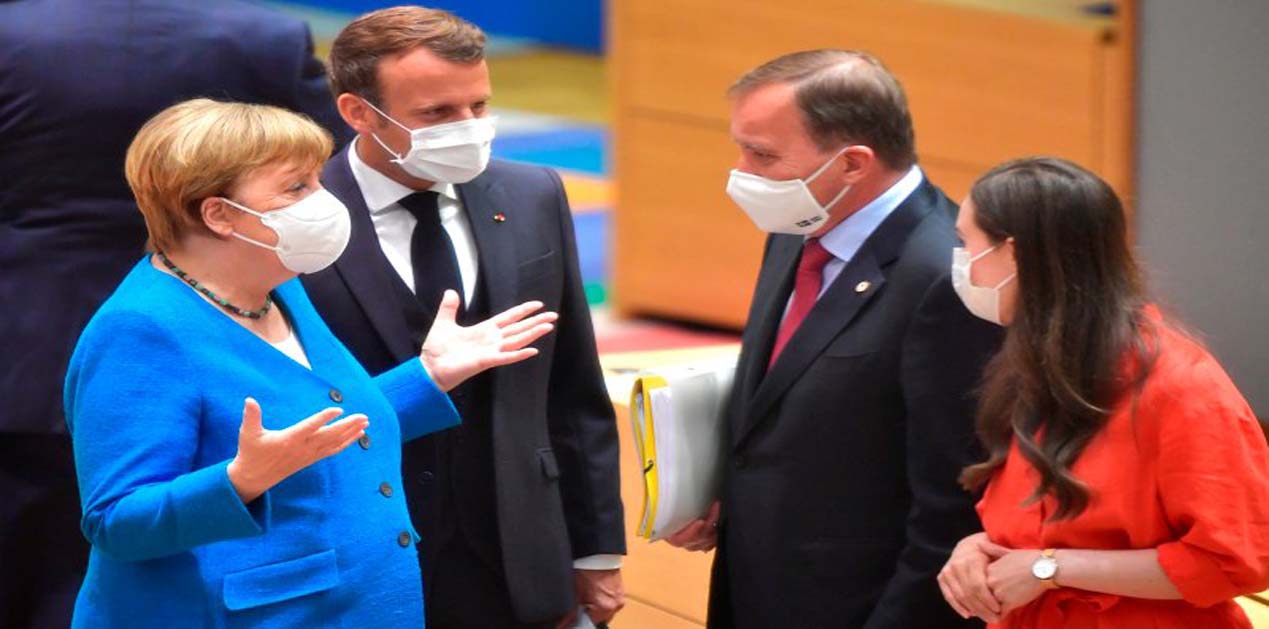The EU adopted a Euro 1.074 trillion dollar budget for a seven-year budget cycle from 1921-27 last month. This was combined with a Euro 750 billion package to assist the Member States to recover from the impact of COVID-19 on their economies.1 While the former is part of the regular budget exercise, the latter is a one-off facility. The budget comes from the contributions of the Member States. The special funding programme also called ‘Next Generation EU’ (NGEU) will be financed by the European Commission’s borrowing from the market. This is first of its kind. The step has dispelled any doubts on the EU’s capacity to meet Europe’s challenges for the future. It has certainly lifted the gloom after Brexit.
The EU follows a seven-year budget cycle called the Multiannual Financial Framework (MFF). The present budget was delayed on account of uncertainty following Brexit which left a large resource gap for the EU to meet. While the sum represents a substantial amount, it represents 1 percent of the EU’s 13 trillion Euro economy. The special package of Euro 750 billion includes Euro 390 billion in grant and Euro 360 billion in credit2. The grant element was scaled down from Euro 500 billion initially proposed due to opposition from a group of four countries called the Netherlands, Austria, Sweden and Denmark. Nevertheless, the higher grant element in the package a genuine effort not to add to the debt burden of the recipient States.
The final deal approved by EU leaders rejected the attempt to impose conditions on the disbursement of the fund by linking it to compliance by the recipient States with EU’s core values. This goes back to ‘the rule of law’ debate in EU about actions of Hungarian and Polish governments. The European Commission initiated article 7 proceedings against Poland in December 2017 and the European Parliament against Hungary in September 2018. The article is invoked in case of a ‘clear risk of a serious breach by a Member State of the values referred to in Article 2’ which are ‘values of respect for human dignity, freedom, democracy, equality, the rule of law and respect for human rights, including the rights of persons belonging to minorities.’3 The move to link funding to the issue of action under article 7 was resisted by Prime Minister Victor Orban of Hungary, who threatened to block the entire recovery package. It was eventually dropped.
Some of the countries backing the move secured EU’s concurrence to the reduction in their budget share. The compromise also involved cuts in the EU’s R&D spending and the Green budget. This would affect the EU’s Horizon science programme. This would also adversely impact on the EU’s ‘Just Transition Fund’ to help poorer countries reduce their carbon emissions.4 Though the regular budget and the special package to provide relief to Member States whose economies devastated by COVID are technically different, such linkages cannot be ruled out. In both cases, the approving authority in the Council are Heads of Government.
Before the 7 year budget also called Multiannual Financial Framework (MFF) was adopted there was apprehension that competing demands on limited resources would lead to the diversion of funding from cohesion fund, which benefits the east European countries to need for southern States like Italy, Greece and Spain. They were affected by economic slow-down even before the outbreak of COVID. The pandemic has devastated economies of Italy and Spain. Fortunately, this did not happen.
The EU budget is subject to the approval by the European Parliament. The MEPs (Members of European Parliament) cutting across party lines have voiced their opposition to the budget, which they believed lacked ‘ambition’. Their preference was for a Euro 1.4 trillion budget, instead of Euro 1.07 trillion budget finally approved. The European Parliament has adopted a resolution against the budget approved by the EU government leaders. However, it is unlikely to veto it. The European Parliament does not control the special package approved to fight COVID, which represents market borrowing.
The programme of market borrowing by the European Commission to pay for the cost of COVID package was hailed by President Macron of France, who described Euro 390 billion of grants constituted 'transfers’ within the Union and amount to ‘creating a budget in the eurozone’. He added ‘These are legitimate transfers.’ This was directly rebutted by the Netherlands Prime Minister Mark Rutte. He said that ‘This is a one-off’ and denied there could be a permanent transfer mechanism.5 This reflects the North-South rift which opened up in EU following the economic crisis of 2008-11.
The health of the EU economy is of direct concern to India. The EU is India's largest trading partner, accounting for €80 billion worth of trade in goods in 2019 or 11.1% of total Indian trade, on par with the USA and ahead of China (10.7%).6 India is the EU’s 10th largest trading partner, accounting for 1.9% of EU total trade in goods in 2019, well behind the USA (15.2%), China (13.8%) and the UK (12.6%). EU foreign direct investment stocks in India amounted to €68 billion in 2018, which is significant but way below EU foreign investment stocks in China (€175 billion) or Brazil (€312 billion). Indian companies invested over €50 billion in Europe since 2000.7
The size of the economic package offered by the EU is encouraging, but EU economies, like the economies of the rest of the world, have been devastated by COVID. The Eurozone’s GDP fell 40.3 percent on an annual basis far exceeding the 32.9 percent contraction in the US economy over the same period.8 The Eurozone’s unemployment rate has gone up from 7.2 percent earlier this year to 7.8 percent in June. The ratio of government debt to GDP of the EU’s leading economies ranging from 70 percent for Germany to above 110 percent for France and above 150 percent for Italy.9 But for the time being, the EU’s robust response has proved the vitality of its institutional mechanism, and the Franco-German cooperation which has been the motor of EU expansion for decades.
Endnotes
- Financial Times, Editorial Board, July 21 2020
- Ibid
- Jack Delors Center, Martin Michelot
- Financial Times, EU leaders strike deal on Euro 750 bn recovery fund after marathon summit, July 21 2020
- Financial Times, Despite historic EU deal, deep rifts remain, July 22 2020
- https://ec.europa.eu/trade/policy/countries-and-regions/countries/india/
- Ibid
- Wall Street Journal, Europe Plunges Into Recession as Economy Suffers Record Contraction, July 31 2020
- Ibid
(The paper is the author’s individual scholastic articulation. The author certifies that the article/paper is original in content, unpublished and it has not been submitted for publication/web upload elsewhere, and that the facts and figures quoted are duly referenced, as needed, and are believed to be correct). (The paper does not necessarily represent the organisational stance... More >>
Image Source: https://api.time.com/wp-content/uploads/2020/07/eu-summit-budget-coronavirus-recovery-fund.jpg?w=800&quality=85










Post new comment